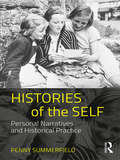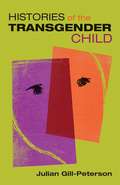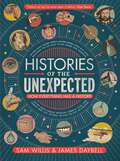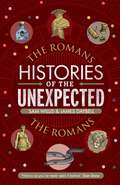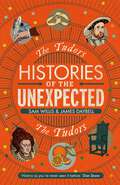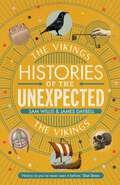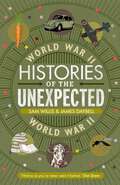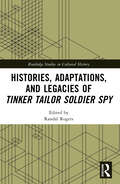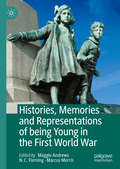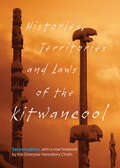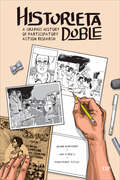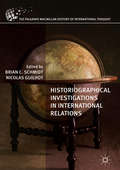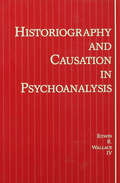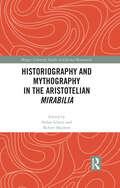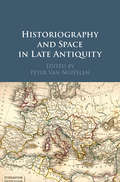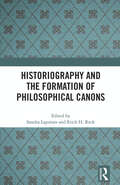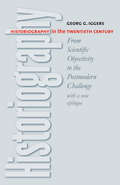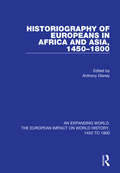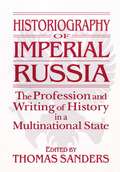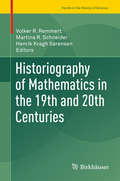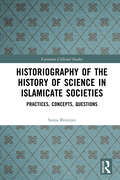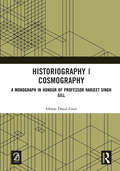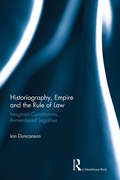- Table View
- List View
Histories of the Self: Personal Narratives and Historical Practice
by Penny SummerfieldHistories of the Self interrogates historians’ work with personal narratives. It introduces students and researchers to scholarly approaches to diaries, letters, oral history and memoirs as sources that give access to intimate aspects of the past. Historians are interested as never before in how people thought and felt about their lives. This turn to the personal has focused attention on the capacity of subjective records to illuminate both individual experiences and the wider world within which narrators lived. However, sources such as letters, diaries, memoirs and oral history have been the subject of intense debate over the last forty years, concerning both their value and the uses to which they can be put. This book traces the engagement of historians of the personal with notions of historical reliability, and with the issue of representativeness, and it explores the ways in which they have overcome the scepticism of earlier practitioners. It celebrates their adventures with the meanings of the past buried in personal narratives and applauds their transformation of historical practice. Supported by case studies from across the globe and spanning the fifteenth to twenty-first centuries, Histories of the Self is essential reading for students and researchers interested in the ways personal testimony has been and can be used by historians.
Histories of the Transgender Child
by Jules Gill-PetersonA groundbreaking twentieth-century history of transgender children With transgender rights front and center in American politics, media, and culture, the pervasive myth still exists that today&’s transgender children are a brand new generation—pioneers in a field of new obstacles and hurdles. Histories of the Transgender Child shatters this myth, uncovering a previously unknown twentieth-century history when transgender children not only existed but preexisted the term transgender and its predecessors, playing a central role in the medicalization of trans people, and all sex and gender.Beginning with the early 1900s when children with &“ambiguous&” sex first sought medical attention, to the 1930s when transgender people began to seek out doctors involved in altering children&’s sex, to the invention of the category gender, and finally the 1960s and &’70s when, as the field institutionalized, transgender children began to take hormones, change their names, and even access gender confirmation, Julian Gill-Peterson reconstructs the medicalization and racialization of children&’s bodies. Throughout, they foreground the racial history of medicine that excludes black and trans of color children through the concept of gender&’s plasticity, placing race at the center of their analysis and at the center of transgender studies.Until now, little has been known about early transgender history and life and its relevance to children. Using a wealth of archival research from hospitals and clinics, including incredible personal letters from children to doctors, as well as scientific and medical literature, this book reaches back to the first half of the twentieth century—a time when the category transgender was not available but surely existed, in the lives of children and parents.
Histories of the Unexpected: How Everything Has a History (Histories Of The Unexpected Ser.)
by Sam Willis James Daybell'History as you've never seen it before.' Dan Snow'A wonderful, eclectic and entertaining history of everything, full of fascinating, surprising stories.' Suzannah LipscombDid you know that the history of the beard is connected to the Crimean War; that the history of paperclips is all about the Stasi; and that the history of bubbles is all about the French Revolution? And who knew that Heinrich Himmler, Tutankhamun and the history of needlework are linked to napalm and Victorian orphans?In Histories of the Unexpected, Sam Willis and James Daybell lead us on a journey of discovery that tackles some of the greatest historical themes - from the Tudors to the Second World War, from the Roman Empire to the Victorians - but via entirely unexpected subjects.By taking this revolutionary approach, they not only present a new way of thinking about the past, but also reveal the everyday world around us as never before.
Histories of the Unexpected: The Romans (Histories of the Unexpected)
by Sam Willis James DaybellThe Histories of the Unexpected series not only presents a new way of thinking about the past, but also reveals the world around us as never before. Traditionally, the Romans have been understood in a straightforward way but the period really comes alive if you take an unexpected approach to its history. Yes, emperors, the development of civilization and armies all have a fascinating history . . . but so too do tattoos, collecting, fattening, recycling, walking, poison, fish, inkwells and wicked stepmothers! Each of these subjects is equally fascinating in its own right, and each sheds new light on the traditional subjects and themes that we think we know so well.
Histories of the Unexpected: The Tudors (Histories of the Unexpected)
by Sam Willis James DaybellThe Histories of the Unexpected series not only presents a new way of thinking about the past, but also reveals the world around us as never before. Traditionally, the Tudors have been understood in a straightforward way but the period really comes alive if you take an unexpected approach to its history. Yes, Tudor monarchs, exploration and religion have a fascinating history . . . but so too do cannibalism, shrinking, bells, hats, mirrors, monsters, faces, letter-writing and accidents! Each of these subjects is equally fascinating in its own right, and each sheds new light on the traditional subjects and themes that we think we know so well.
Histories of the Unexpected: The Vikings (Histories of the Unexpected)
by Sam Willis James DaybellThe Histories of the Unexpected series not only presents a new way of thinking about the past, but also reveals the world around us as never before. Traditionally, the Vikings have been understood in a straightforward way—but the period really comes alive if you take an unexpected approach to its history. Yes, ships, raiding and trade have a fascinating history, but so too do hair, break-ins, toys, teeth, mischief, luck and silk! Each of these subjects is equally fascinating in its own right, and each sheds new light on the traditional subjects and themes that we think we know so well.
Histories of the Unexpected: World War II (Histories of the Unexpected)
by Sam Willis James DaybellThe Histories of the Unexpected series not only presents a new way of thinking about the past, but also reveals the world around us as never before. Traditionally, World War II has been understood in a straightforward way but the period really comes alive if you take an unexpected approach to its history. Yes, battles, bombs and bravery all have a fascinating history . . . but so too do handkerchiefs, furniture, Mozart, insects, blood, mothers, suicide, darkness, cancer and puppets! Each of these subjects is equally fascinating in its own right, and each sheds new light on the traditional subjects and themes that we think we know so well.
Histories, Adaptations, and Legacies of Tinker, Tailor, Soldier, Spy (Routledge Studies in Cultural History)
by Randal RogersWhile providing critical reflections on the work across generations of enthusiasts, this is the first book exclusively dedicated to John le Carré’s 1974 novel and its adaptations in radio, TV, and film. Tinker Tailor Soldier Spy stands among the most reproduced espionage tales of all time, with adaptations in television, radio, and film. Histories, Adaptations, and Legacies of Tinker Tailor Soldier Spy is a collection of essays by international experts who each provides an account of the story’s currency across generations of audiences and scholars. Fans of the late John le Carré and the espionage genre will find here a comprehensive guidebook to the novel and its adaptations. Scholars, students, and amateur investigators alike will discover important historical, thematic, and theoretical ideas to explore and interrogate. Tinker Tailor Soldier Spy is a complex tale of the espionage trade and its crew of motley eccentrics. This collection decodes its puzzles, riddles, and enigmas regarding secrecy, betrayal, ethics, and survival in the context of the United Kingdom’s place in the post-Second World War global order. A comprehensive guide for amateurs and an in-depth study of the novel’s histories, legacies, and approaches for students and scholars.
Histories, Memories and Representations of being Young in the First World War
by Maggie Andrews N. C. Fleming Marcus MorrisThis book seeks to place children and young people centrally within the study of the contemporary British home front, its cultural representations and its place in the historical memory of the First World War. This edited collection interrogates not only war and its effects on children and young people, but how understandings of this conflict have shaped or been shaped by historical memories of the Great War, which have only allowed for several tropes of childhood during the conflict to emerge. It brings together new research by emerging and established scholars who, through a series of tightly focussed case studies, introduce a range of new histories to both explore the experience of being young during the First World War, and interrogate the memories and representations of the conflict produced for children. Taken together the chapters in this volume shed light on the multiple ways in which the Great War shaped, disrupted and interrupted childhood in Britain, and illuminate simultaneously the selectivity of the portrayal of the conflict within the more typical national narratives.
Histories, Territories and Laws of the Kitwancool: Second Edition, with a New Foreword by the Gitanyow Hereditary Chiefs
by Peter Williams Ernest Smith Maggie Good B. W. McKilvington Walter Derrick Solomon Good Walter Douse Fred GoodA new edition of the groundbreaking 1958 publication created in collaboration with the Gitanyow Hereditary Chiefs.This beautiful new edition of the histories and laws of the Gitanyow (literally “people of the small/narrow place,” once called the Kitwancool in settler accounts), as recounted to museum curator Wilson Duff in 1958, includes a new foreword by Gitanyow Hereditary Chiefs while preserving the original text. Until the mid-twentieth century, the village of Kitwancool (now Gitanyow) was only accessible to outsiders by trail. This inaccessibility of territory protected a deeply independent spirit and unique legal system, recorded here as part of an agreement that allowed for the removal of Gitanyow totem poles to the Royal BC Museum for preservation. The complete histories of the Gitanyow, told in their own words, were also translated and recorded here as part of the same agreement.This publication not only captures the histories, territories and laws of the Gitanyow, but also a significant moment in time for settler-Indigenous relations, and the origin story for totem poles still standing at the Royal BC Museum today.Histories, Territories and Laws of the Kitwancool is a must-read for anyone who wants to understand Gitanyow society and belief.
Historieta Doble: A Graphic History of Participatory Action Research (ethnoGRAPHIC)
by Joanne Rappaport Lina Flórez G. Pablo Pérez “Altais”In the 1970s, new methods of social science research began to flower in Latin America, connecting academic researchers to grassroots social movements. One of these was participatory action research, a method now used by community organizers, educational activists, and social scientists around the world. Historieta Doble traces the roots of participatory action research to the Caribbean coast of Colombia, and to the work of visionary sociologist Orlando Fals Borda with the Colombian Peasant Movement. Beautifully illustrated, this graphic novel shows how Fals Borda combined research and theory with political participation and activism, using comics to capture rural historical memory and allow peasants to see themselves as historical actors. This graphic history presents a fascinating journey through time, weaving Fals Borda’s original research with Joanne Rappaport’s contemporary reconstruction of his compelling story. The book features the artistic work of Ulianov Chalarka, whose comic panels brought Fals Borda’s research to life in the 1970s. Historieta Doble is a visual and narrative feast that transcends eras, connecting the past and present within the vibrant world of Latin American comics.
Historiographic Reasoning (Elements in Historical Theory and Practice)
by Aviezer TuckerHistoriographic reasoning from evidentiary inputs is sui generis. Historiography is neither empirical, nor self-knowledge, nor a genre of fiction or ideology. Historiographic reasoning is irreducible to general scientific or social science reasoning. The book applies Bayesian insights to explicate historiographic reasoning as probable. It distinguishes epistemic transmission of knowledge from evidence from the generation of detailed historiographic knowledge from multiple coherent and independent evidentiary inputs in three modular stages. A history of historiographic reasoning since the late 18th century demonstrates that there was a historiographic scientific revolution across the historical sciences in the late 18th and early 19th centuries. The underdetermination of historiography by the evidence, counterfactual historiographic reasoning, and false reasoning and other fallacies are further explained and discussed in terms of the probabilistic relations between the evidence and historiography.
Historiographical Investigations in International Relations (The Palgrave Macmillan History of International Thought)
by Nicolas Guilhot Brian C. SchmidtThis book critically investigates the historiography of International Relations. For the past fifteen years, the field has witnessed the development of a strong interest in the history of the discipline. The chapters in this edited volume, written by some of the field’s preeminent disciplinary historians, all manifest the best of an innovative and exciting generation of scholarship on the history of the discipline of International Relations. One of the objectives of this volume is to take stock of the historical turn. Yet this volume is not simply a stock-taking exercise, as it also intends to identify the limitations and blind spots of the recent historiographical literature. The chapters consider a range of diverse thinkers and examine their impact on understanding various dimensions of the field’s history.
Historiography And Historical Method
by Directorate of Distance Education - Madurai Kamaraj UniversityThe textbook Historiography and Historical Method, part of the M.A. History First Year program at Madurai Kamaraj University, offers a comprehensive exploration into the philosophy, development, and methodology of history. It begins by probing the fundamental question, “What is history?”, and introduces learners to a wide range of historiographical traditions—from ancient Greek and Roman writings to Eastern, Arab, and Indian contributions. The text delves into key theoretical approaches such as Idealism, Historicism, Relativism, and Marx’s Dialectical Materialism. It emphasizes the historian’s role in interpretation and objectivity, and presents a rigorous framework for historical research, including heuristics, criticism, synthesis, and documentation. Additionally, it discusses whether history should be seen as an art or a science, analyzes various types of history (political, economic, social, diplomatic), and explores its integration with allied subjects like geography and political science. The book equips students not only to understand past events, but to critically analyze how history is written and used in society.
Historiography and Causation in Psychoanalysis
by Edwin R. Wallace, IVWhat do the psychoanalyst and the historian have in common? This important question has stimulated a lively debate within the psychoanalytic profession in recent years, bearing as it does on the very nature of the psychoanalytic enterprise. Edwin Wallace, a clinician with training in the history and philosophy of science, brings a ranging scholarly perspective to the debate, mediating between rival perspectives and clarifying the issues at stake in the process of offering his own thoughtful conception of the historical nature of psychoanalysis. For Wallace, the procedures, problems, and interpretive possibilities of psychoanalysis and history are strikingly constant and mutually illuminating. He insists, further, that the fundamentally historical nature of psychoanalysis poses no threat to its scientific dignity. In arriving at this verdict, Wallace pushes beyond his expansive treatment of the many parallels between history and psychoanalysis to a systematic consideration of the problem of causation in both disciplines. Tracing the historical background of causation in science, philosophy, history, and analysis, he offers a logical analysis of determinism and a critique of causal language in psychoanalysis while adumbrating the historical character of psychoanalytic explanation. Historiography and Causation in Psychoanalysis is a thought-provoking work that cuts across disciplinary boundaries. It will cultivate the historical sensibilities of all its clinical readers, broadening and deepening the intellectual perspective they bring to the dialogue about the nature of psychoanalytic work. Timely and rewarding reading for analysts, psychiatrists, and clinical psychologists, it will be welcomed by historians and philosophers as well.
Historiography and Mythography in the Aristotelian Mirabilia (Rutgers University Studies in Classical Humanities)
by Robert Mayhew Stefan SchornThis is the first full-length volume in English that focuses on the historiographical section of the Mirabilia or De mirabilibus auscultationibus (On Marvelous Things Heard), attributed to Aristotle but not in fact by him. The central section of the Mirabilia, namely §§ 78–151, for the most part deals with historiographical material, with many of its entries having some relationship to ancient Greek historians of the 4th and 3rd centuries BC. The chapters in this volume discuss various aspects of this portion of the text, including textual issues involving toponyms; possible structural principles behind the organization of this section; the passages on Theopompus and Timaeus; mythography; the philosopher Heracleides of Pontos; Homeric exegesis; and the interrelationship between pseudo-Plutarch’s On Rivers, a section of the historian Stobaeus’ Geography, and the Mirabilia. Historiography and Mythography in the Aristotelian Mirabilia is an invaluable resource for scholars and students of this text, and of Greek philosophy, historiography, and literature more broadly.
Historiography and Space in Late Antiquity
by Peter Van NuffelenThe Roman Empire traditionally presented itself as the centre of the world, a view sustained by ancient education and conveyed in imperial literature. Historiography in particular tended to be written from an empire-centred perspective. In Late Antiquity, however, that attitude was challenged by the fragmentation of the empire. This book explores how a post-imperial representation of space emerges in the historiography of that period. Minds adapted slowly, long ignoring Constantinople as the new capital and still finding counter-worlds at the edges of the world. Even in Christian literature, often thought of as introducing a new conception of space, the empire continued to influence geographies. Political changes and theological ideas, however, helped to imagine a transferral of empire away from Rome and to substitute ecclesiastical for imperial space. By the end of Late Antiquity, Rome was just one of many centres of the world.
Historiography and the Formation of Philosophical Canons
by Sandra Lapointe Erich H. ReckThis book presents a series of case studies and reflections on the historiographical assumptions, methods and approaches that shape the way in which philosophers construct their own past. The chapters in the volume advance discussion of the methods of historians of philosophy, while at the same time illustrating the various ways in which philosophical canons come into existence, debunking the myth of analytical philosophy’s ahistoricism and providing a deeper understanding of the roles historiographical devices play in philosophical thought. More importantly, the contributors attempt to understand history of philosophy in connection with other historical and historiographical approaches: contributors engage classical history of science, sociology of knowledge, history of psychology and historiography, in dialogue with historiographical practices in philosophy more narrowly construed. Additionally, select chapters adopt a more diverse perspective, by making place for non-Western approaches and for efforts to construe new philosophical narratives that do justice to the voice of women across the centuries. Historiography and the Formation of Philosophical Canons will be of interest to researchers and advanced students working in history of philosophy, meta-philosophy, philosophy of history, historiography, intellectual history and sociology of knowledge.
Historiography in the Twentieth Century: From Scientific Objectivity to the Postmodern Challenge
by Georg G. Iggers&“No one looking for a well-informed introduction to . . the key views of history adopted by professional historians . . could find a better one than this.&” ―Richard J. Evans, author of In Defence of History A broad perspective on historical thought and writing, with a new epilogue. In this book, now published in ten languages, a preeminent intellectual historian examines the profound changes in ideas about the nature of history and historiography. Georg G. Iggers traces the basic assumptions upon which historical research and writing have been based, and describes how the newly emerging social sciences transformed historiography following World War II. The discipline&’s greatest challenge may have come in the last two decades, when postmodern ideas forced a reevaluation of the relationship of historians to their subject and questioned the very possibility of objective history. Iggers sees the contemporary discipline as a hybrid, moving away from a classical, macrohistorical approach toward microhistory, cultural history, and the history of everyday life. The new epilogue, by the author, examines the movement away from postmodernism towards new social science approaches that give greater attention to cultural factors and to the problems of globalization. &“The book has all the virtues one associates with Georg Iggers—lucidity, detachment, balance, and the ability to reveal the relation between trends in historical writing and their political and cultural contexts.&” —Peter Burke, Cambridge University
Historiography of Europeans in Africa and Asia, 1450–1800 (An Expanding World: The European Impact on World History, 1450 to 1800 #4)
by Anthony DisneyThe first part of this volume deals with the changes and continuities in historical approaches over the last fifty years, with three further sections focusing on initial contacts, formal presences, and informal presences. Emphasis has been placed on the major European players in Asia and Africa before 1800 - the Portuguese, Dutch and English, without neglecting the role played by the French, Spanish, Scandinavians and others.
Historiography of Imperial Russia: The Profession and Writing of History in a Multinational State
by Thomas SandersThis collection of the best new and recent work on historical consciousness and practice in late Imperial Russia assembles the building blocks for a fundamental reconceptualization of Russian history and history writing.
Historiography of Mathematics in the 19th and 20th Centuries
by Volker R. Remmert Martina R. Schneider Henrik Kragh SørensenThis book addresses the historiography of mathematics as it was practiced during the 19th and 20th centuries by paying special attention to the cultural contexts in which the history of mathematics was written. In the 19th century, the history of mathematics was recorded by a diverse range of people trained in various fields and driven by different motivations and aims. These backgrounds often shaped not only their writing on the history of mathematics, but, in some instances, were also influential in their subsequent reception. During the period from roughly 1880-1940, mathematics modernized in important ways, with regard to its content, its conditions for cultivation, and its identity; and the writing of the history of mathematics played into the last part in particular. Parallel to the modernization of mathematics, the history of mathematics gradually evolved into a field of research with its own journals, societies and academic positions. Reflecting both a new professional identity and changes in its primary audience, various shifts of perspective in the way the history of mathematics was and is written can still be observed to this day. Initially concentrating on major internal, universal developments in certain sub-disciplines of mathematics, the field gradually gravitated towards a focus on contexts of knowledge production involving individuals, local practices, problems, communities, and networks. The goal of this book is to link these disciplinary and methodological changes in the history of mathematics to the broader cultural contexts of its practitioners, namely the historians of mathematics during the period in question.
Historiography of the History of Science in Islamicate Societies: Practices, Concepts, Questions (Variorum Collected Studies)
by Sonja BrentjesThis book presents eight papers about important historiographical issues as debated in the history of science in Islamicate societies, the history of science and philosophy of medieval Latin Europe and the history of mathematics as an academic discipline. Six papers deal with themes about the sciences in Islamicate societies from the ninth to the seventeenth centuries, among them novelty, context and decline. Two other papers discuss the historiographical practices of historians of mathematics and other disciplines in the nineteenth and twentieth centuries. The central argument of the collected papers is that in addition and beyond the study of scientific texts and instruments historians of science in Islamicate societies need to pay attention to cultural, material and social aspects that shaped the scientific activities of the authors and makers of such texts and instruments. It is pointed out that the diachronic, de-contextualized comparison between methods and results of scholars from different centuries, regions and cultures often leads to serious distortions of the historical record and is responsible for the long-term neglect of scholarly activities after the so-called "Golden Age". The book will appeal in particular to teachers of history of science in Islamicate societies, to graduate students interested in issues of methodology and to historians of science grappling with the unresolved problems of how think and write about the sciences in concrete societies of the past instead of subsuming all extant texts, instruments, maps and other objects related to the sciences under macro-level concepts like Islam or Latin Europe. (CS 1114).
Historiography | Cosmography: A Monograph in Honour of Professor Harjeet Singh Gill
by Ishwar Dayal GaurThis book attempts to study Panjab historiography from the viewpoint of cosmography, the concept derived from the cosmological paradigm which Professor Harjeet Singh Gill, an eminent semiotician, developed in his oeuvre. Since its introduction in the colonial Panjab, the discipline of historiography subdued the indigenous craft of history writing such as katha, qissa, janamsakhi, and jangnama wherein what Professor Gill has conceptualized as “the dialectic of representation and transcendence” remained ever active. This title has been co-published with Aakar Books. Print editions not for sale in South Asia (India, Sri Lanka, Nepal, Bangladesh, Pakistan and Bhutan)
Historiography, Empire and the Rule of Law: Imagined Constitutions, Remembered Legalities
by Ian DuncansonHistoriography, Empire and the Rule of Law considers the intersection of these terms in the historical development of what has come to be known as the ‘rule of law’. The separation of governmental powers, checks and balances, and judicial independence signified something entirely new in the way in which politics was imagined and practiced. This ‘rule of law’ cannot, as it often is, be traced to the justification and practice of government as originating in a social contract among the governed; but rather, by analogy with a popular conveyancing innovation of the era, to the trust – a device by which the power of ownership of land could be restrained. But how could the restraint of power remain consistent with the avoidance of anarchic disagreement among those granted the task of supervision and restraint? In response, it is argued here, the central legal and political task became one of managing disagreement and change peacefully and constructively – by drawing on a colonial tradition that emphasised civility, negotiation and compromise. And the study of all of these qualities as they evolved, Ian Duncanson contends, is vital to understanding the emergence of the ‘rule of law’. Historiography, Empire and the Rule of Law will be invaluable for all those engaged in research and the postgraduate study of socio-legal and constitutional studies, and early modern and modern history.
